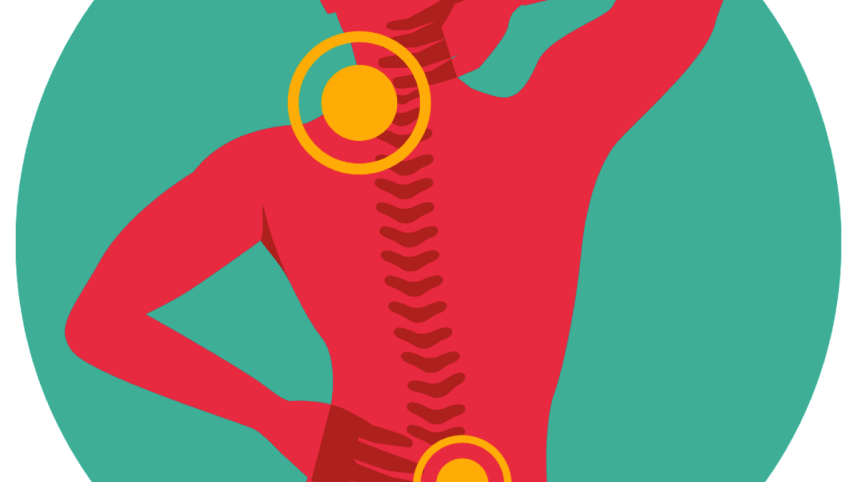Back to the Wall: How I live with back pain

My constant state of pain comes from an injury I had some six-odd years ago when I slipped and fell – from the steps of my yoga class – and landed square on my bottom. The shock that my spine suffered at that moment resulted in two slipped discs: one cervical and one lumbar.
The consequence was a complete 180-degree turnaround of my lifestyle choices, my moods, how I interact in relationships, the way I henceforth sat, stood, slept, when or what I ate… basically my entire life.
And even though my case was somewhat unusual, young people these days, from teenagers to adolescents, all seem to be suffering from severe back issues for far less – like habits and lifestyle choices. It wasn't only because of the heavy bags we carried to school for years and years, but that seems to be one of the earliest contributing factors.
Tanvir Rahman, whose back pain isn't as recurrent, says the pain mostly appears when stuck for two hours in the backseat of a car with two other people on his way home from work.
"I've had a long day already and it's a long way back home, with very little room to move inside the car; it is crammed and uncomfortable," Tanvir says. "And then my pain hits."
Doctors suggest that age, stress, development of various degenerative diseases of the spine (like osteoporosis, fibromyalgia, and arthritis, among others) that occur over time are some of the leading medical causes of back pain. These can occur due to age, natural and/or genetic causes, among others. Lifestyle choices, like lack of exercise, gaining excess weight, and smoking can also lead to various back problems.
However, for Mir Zunayed Hossain, a customer sales representative, there is no "identifiable" reason why his pain may act up.
"It's usually when I have a particularly stressful or busy day at work," says Zunayed, adding that he usually goes on carrying on with work when it's still tolerable. "I may take a day off if the pain is too severe, but mostly I can't because it doesn't seem like that big a deal," he asserts, "Who doesn't have back problems these days?"
Practicing physiotherapist at United Hospital, Dr. Md. Tanvir Alam, notes, "I have found throughout my career that the cause of back pain among young people mostly is postural alignment."
He reasons, "These days we spend most of the time with gadgets like mobile phones, computers, laptops, gaming consoles, etc. Moreover, we do not engage in exercises or outdoor sports anymore due to the lack of time in our hands."
"It is because of physical inactivity that our musculoskeletal structure is becoming vulnerable day by day," Dr. Alam explains.

And that is the irony: our bodies – the structure of our spines – are devolving to one similar to the Hominids', or cave people, because of technological advancement. Growing up, we fell into these unhealthy habits because it was demanded of us from our tech-savvy, easy, social practices resulting in a sedentary lifestyle. We keep working at our desks, hunched over, because most of our jobs are desk jobs and there aren't too many options for physical exercise.
Lifestyle-induced backpain is now such a systemic problem that even if wanted to change it, we wouldn't know where to begin or how to keep up.
But while back pain seems merely like an occasional inconvenience to some, others suffer far more and severely. Studies have found that even sitting down for too long or gaining a little bit of weight can cause disc herniations.
Senior analyst Fairooz Rahman, who has to sit working long hours at desk, complains of chronic pain impacting her moods and relationships. She said her back usually acts up when she's had a lot to do in the office.
"Which is almost always," she mentions. "That means I haven't had the time to take a break or even leave my desk, and the lack of movement or stretching causes a sharp, ceaseless pain that shoots up and down my spine".
When asked if and how it has affects them in their personal lives, she said it makes them irritable and short tempered.
"Suddenly, even the smallest thing triggers me, and I end up picking a fight with my husband and become passive-aggressive with my in-laws," Fairooz tell me.
"There's nothing I can do though. I have a desk job, it requires me to stay seated at my desk for hours at a stretch. Most people in this country have desk jobs, so it makes sense that almost everyone in our generation will have back problems. It's not like we can just quit," she adds.
Similar to her, the pain from my disc herniation became prominent when I started teaching at a school, at least two years after I suffered the injury, surprisingly. The doctor I went to at the time mentioned that the "minor" injury was aggravated due to sitting for long hours and constantly working with my right hand unsupported (I had to check countless copies every day).
However, he couldn't do much because I hadn't completely become bedridden from the pain yet.
But the pain, for me, was still unbearable, and I looked to go to a physiotherapist on my own.

When I first started going to a physio, my doctor mentioned a good practice was to sit on a chair with a hand-rest to support the elbows. Sitting straight in a chair with a back support is also a good idea, and even better, if we can manage to work with a standing desk.
Public health professional Dr. Tareq Salahuddin suggests maintaining a healthy weight as excess weight strains the muscles. He also advised to "avoid movements that strain [the] back" by not slouching, or sitting on a chair with good lower back support.
"Good posture can reduce the stress on back muscles," he added.
With all due respect, and at the risk of contradicting myself, is maintaining this ongoing list of challenging (read: unrealistic for us non-super humans) "tasks" always attainable?
Our "bad" posture is the consequence of our lifestyles. Such lifestyles of ours, in turn, is the consequence of the system, the social practices, the norms, and the lack of attainable options on the contrary. Because we can't make a lifestyle out of being an active Olympic runner in this country. And doctors and medical treatment are expensive – and not sustainable.
Abir Haque, 24, a private university student who also works as a copywriter, demands there be massage facilities at every workplace. It makes sense to me, what sane working individual hasn't asked for that at some point in their working life? My colleagues and I wish for one every other day. But that is wishful thinking, obviously.
Even though a number of workplaces house gyms these days, the people do not have enough time to go to that gym. I mean, no one is really stopping us from spending an hour doing stretches and light exercises, but it has somewhat become ingrained in our understanding that our times are better spent finishing the work at hand.
Besides, are there workstations that have the option of standing desks? I've never seen or heard of those here. And most of the time, we work on chairs that are poorly designed, with no ergonomic support, which are already present in the office.
It would take years to change the work culture, the system, these norms and accordingly, our lifestyles. Our backpains are not getting better – permanently, at least – any time soon.
What are we supposed to do then, stop texting, attending to our emails and quit our jobs? As one of my colleagues aptly puts it, "Our backs are suffering from the weight of our responsibilities."
Maisha Syeda is a writer, painter, and a graduate of English Literature and Writing. She is the sub editor of Daily Star Books.




 For all latest news, follow The Daily Star's Google News channel.
For all latest news, follow The Daily Star's Google News channel.
Comments